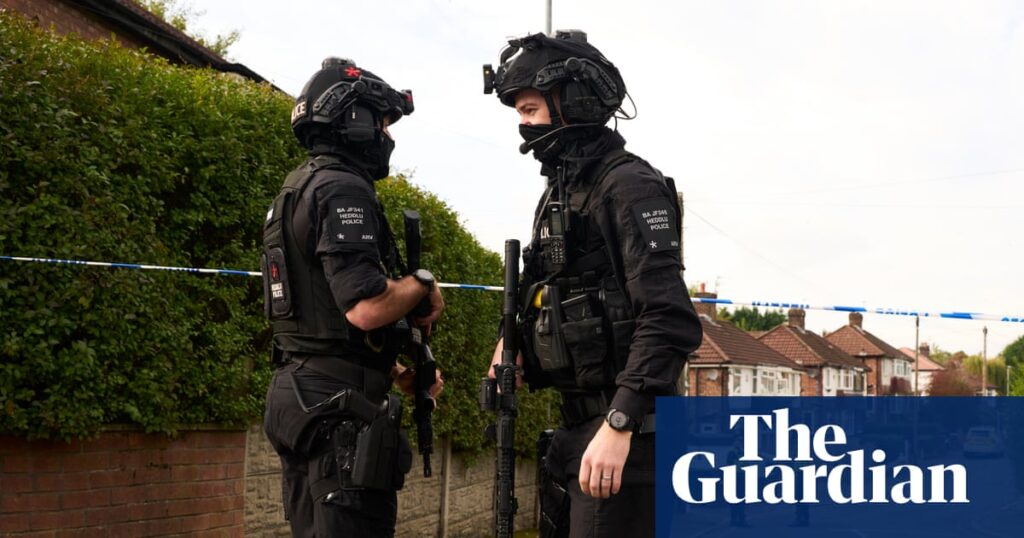MI5 and counter-terrorism police will operate at a heightened state of alert in the coming weeks, reflecting concern that the Manchester synagogue attack risks being followed by others during a period that includes the second anniversary of the 7 October attack by Hamas on Israel.
Policing at synagogues across the country is to be increased. The London mayor, Sadiq Khan, promised “high visibility” patrols in and outside Jewish places of worship to reassure communities and to deter any further threats, while police forces elsewhere in the UK made similar commitments.
Investigations into the attack remain at an early stage, though the central theory is that the killer, who was shot dead by police, had an Islamist motivation. There is no information in the public domain about whether he may have been radicalised by the continued Israeli military campaign and deaths of Palestinians in Gaza.
The attack, at around 9.30am at the Heaton Park Hebrew Congregation synagogue in Crumpsall, Manchester, which killed two and seriously injured four others, was not sophisticated.
There were concerns the attacker was carrying an explosive and appeared to have a vest and items strapped to his waist, but the devices were fakes. Victims at the synagogue, who were marking the last day of Yom Kippur, were stabbed with a knife.
A key line of inquiry for investigators is whether the attacker acted alone, though there is not thought to be any ongoing threat to the public.
Plots directed from overseas, once the norm in the era of al-Qaida, have become rare and individuals are more usually radicalised by following the news or gaining information online.
Investigators also acknowledged that the two-year Israel-Gaza war has changed the threat environment.
Two years ago, Sir Ken McCallum, the head of MI5, said: “There clearly is the possibility that profound events in the Middle East will either generate more volume of UK threat, and/or change its shape in terms of what is being targeted, in terms of how people are taking inspiration.”
In August, Anthony Albanese, Australia’s prime minister, said Iran had directed at least two attacks against his country’s Jewish community, following an investigation by the Australian Security and Intelligence Organisation spy agency, which said it had “credible intelligence” to that end.
The attacks had been ordered by Iran’s Islamic Revolutionary Guard Corps, working through paid intermediaries acting in Australia, and the revelations prompted the Albanese government to expel Tehran’s ambassador to Canberra from Australia.
For now, there is nothing in the public domain to suggest any hostile state involvement or direction in the attack in Manchester.
A review of the overall terror threat level by the Joint Terrorism Analysis Centre, which is based within MI5, is normal after a major incident. It has been held at substantial, the third of five levels, since February 2022 and for the moment is not expected to be raised. However, this will be kept under close review.
A final judgement will depend heavily on the evidence that emerges in the coming days from a search of the attacker’s phone and other digital devices, his online histories and his property.
The last period of significant Islamist terrorism attacks was in the spring and summer of 2017, beginning with an attack on Westminster Bridge in March and followed by further atrocities at Manchester Arena and London Bridge in May and June respectively.
Ideologically similar attacks are not the only concern for police and spy agencies. A fortnight after the London Bridge incident, a van was driven into a mosque at Finsbury Park, north London, in a premeditated act of violence after a period of heightened tension.
Though the emphasis of the past few years has been on state threats to the UK – particularly from Russia since the start of its full-scale invasion of Ukraine, but also Iran and China – MI5 has been clear the threat from terrorism remains.
A year ago, in his last annual review, McCallum said the security service and the police had disrupted “43 late-stage terror plots” since the Westminster attack in March 2017. Three quarters were Islamist extremist plots, he added.

